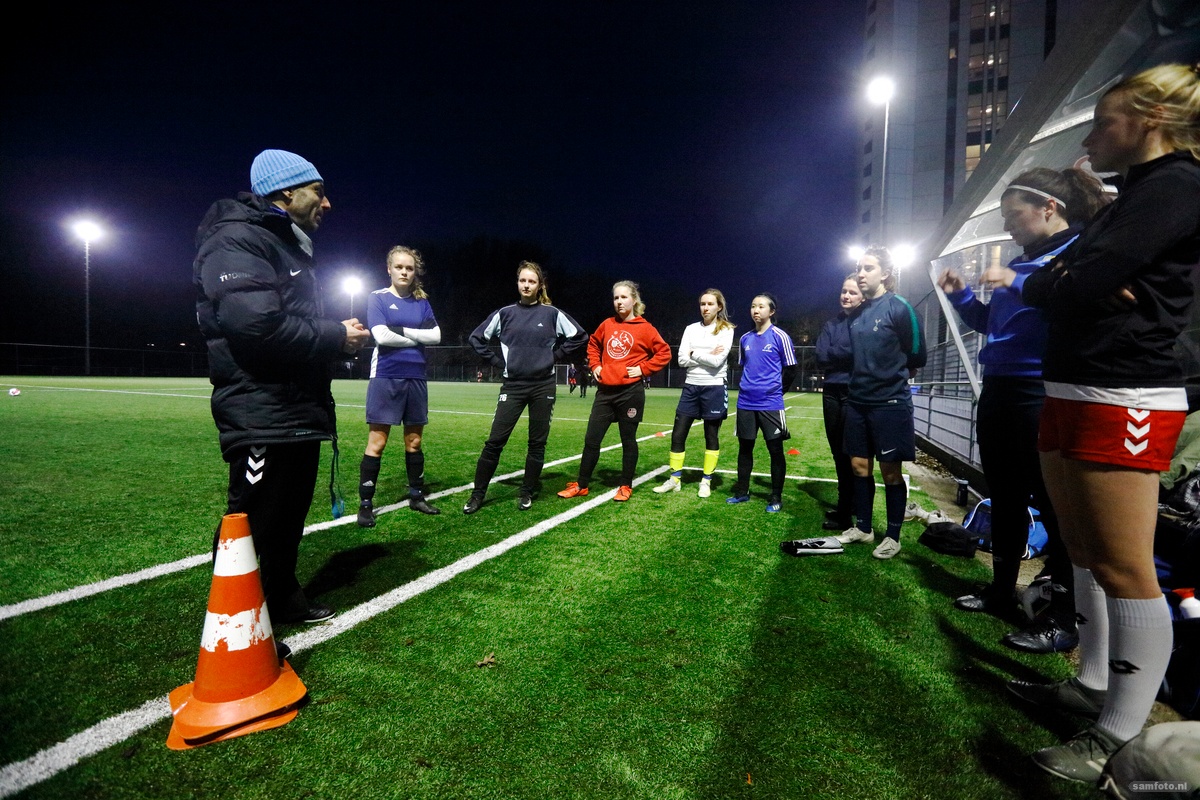How are students handling the ban on sports training and lessons in the evenings? What are the options for sports clubs to keep exercising?
The women’s Ariston’80 A team is on the field early. (Photo: Sam Rentmeester)
Wednesday morning, 07:00. About 20 Ariston’80 footballers trickle onto the field. The brave women are in shorts, in barely four degrees and a freezing wind. If they can’t train in the evening, then it’s got to be before lectures. Actually, concludes player Sarah van Burk afterwards, the training itself is just like any other training session. “It is early, but once you start playing it’s not that bad. I prefer the evening, but this is a good alternative so we can continue playing. Once a week is doable.”
The men’s team also trains in other time slots. For the lower level teams, the club has dreamt up ‘winter afternoon football’, says Board Member Ike Huisman. Any member can sign up. “We want to train twice a week, depending on how many people turn up.”
Poll
The latest corona restrictions mean that X, the sports and cultural centre at TU Delft, may no longer run physical activities after 17:00. Between 17:00 and 23:00 is usually the busiest part of the day.
“Where we can, we do offer students the opportunity to stay healthy, fit and positive,” says Communications Officer Stephanie Mol. “We did a poll among our target group to gauge the interest in doing sports during the day. As far we can, we have taken the answers into account so that people can still do something.”
Some evening lessons could be moved to daytime, others are available online. The gym’s capacity was increased by adding extra time slots. The complex is not open earlier than usual. Mol does see that X is more lively than usual during the day, especially around lunchtime and in the late afternoon. But she says that this is not comparable to how busy it would get on a normal evening.
‘We cannot satisfy everyone’
Associations may reserve a field, room or hall if they wish. “We need to book a room for one or two hours,” says Marjolein Wolbers, Chair of DSHV Torius, the handball association. “There is reasonable interest in playing, but it’s less than normal. It’s good to play a match with mixed teams of men and women.”
Chair Tijmen Hartsuiker of the basketball association Punch, feels down because X cannot offer his club a fixed time for the court. “That surprises me. I understand that they can’t fully continue our normal time, but not offering an alternative at all is not good. They make the halls available for reservation only. Our Board issued an email advising our members to book an hour if they want to play or train.”
Hartsuiker blames the situation on the high demand for the indoor spaces. “X is also used for gym classes for school pupils. If you want to book a space, you have to be ready at midnight when the registration opens.” The Chair sees no benefits in playing outdoors. “It would be a different game, and it’s too cold to play.”
Points of contact
The idea behind the corona restrictions is to reduce the number of points of contact. Do these restrictions not run counter to the whole idea? Huisman, Board Member of Ariston, does see that fewer people turn up. “A smaller number of people sign up for an afternoon session than usually come and train. Ten to 20 at the most.” “Everyone wants to continue doing sports and if they can, why not?” says Torius’ Wolbers.
“It is a dilemma,” says Communications Officer Mol. “On the one hand the Government is calling for fewer points of contact, but on the other hand it wants people to stay healthy physically and mentally. We are trying to find a compromise. We are looking at what fits the measures to keep everyone safe. We are aware that daytime is not perfect and that we cannot satisfy everyone. We treat associations and every individual member equally. We make the spaces that we have available.”
Jimmy Tigges / Redacteur Sport



Comments are closed.